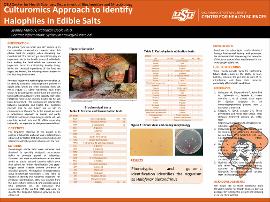| dc.contributor.author | Marouk, Sydney | |
| dc.contributor.author | Deole, Ratnakar | |
| dc.date.accessioned | 2023-09-12T16:44:59Z | |
| dc.date.available | 2023-09-12T16:44:59Z | |
| dc.date.issued | 2022-02-18 | |
| dc.identifier | ouhd_Marouk_culturomicsapproachtoidentify_2022 | |
| dc.identifier.citation | Marouk, S., & Deole, R. (2022, February 18). Culturomics approach to identify halophiles in edible salts. Poster presented at Research Days at Oklahoma State University Center for Health Sciences, Tulsa, Ok. | |
| dc.identifier.uri | https://hdl.handle.net/11244/339530 | |
| dc.description.abstract | Salts have been used in the food industry not only for flavoring of foods but also in food preservation. Refrigeration and vacuum sealing of food products have decreased the need for salt preservation. However, salt is still extensively utilized as a preservative. Salt’s ability as a preservative is because of its ability to reduce the growth of pathogens and other microorganisms that can result in spoilage of food products or illness. It does this by limiting the amount of unboundwater available to be used by microbes and their chemical reactions. However, salt can also be the source of living microorganisms called halophiles that may affect human health especially the gut microbiome. In this project, to determine the microbial communities of edible salts, an investigation was done using a culturomics approach. Four commercially used edible salts were purchased at the food store and dissolved in a solution and plated onto Difco marine agar and broth medium. Edible coarse sea salt showed growth of a halophile. This halophilic organism was purified using plating techniques and further identified using biochemical tests and 16S ribosomalRNA sequencing. | |
| dc.format | application/pdf | |
| dc.language | en_US | |
| dc.publisher | Oklahoma State University Center for Health Sciences | |
| dc.rights | The author(s) retain the copyright or have the right to deposit the item giving the Oklahoma State University Library a limited, non-exclusive right to share this material in its institutional repository. Contact Digital Resources and Discovery Services at lib-dls@okstate.edu or 405-744-9161 for the permission policy on the use, reproduction or distribution of this material. | |
| dc.title | Culturomics approach to identify halophiles in edible salts | |
| osu.filename | ouhd_Marouk_culturomicsapproachtoidentify_2022.pdf | |
| dc.type.genre | Presentation | |
| dc.type.material | Text | |
| dc.subject.keywords | salt | |
| dc.subject.keywords | halophiles | |
| dc.subject.keywords | culturomics | |
